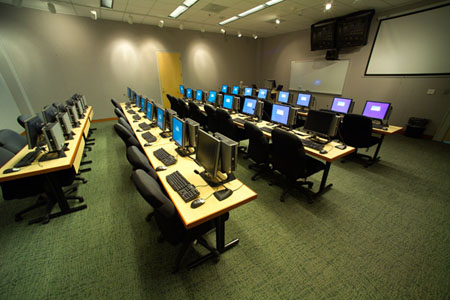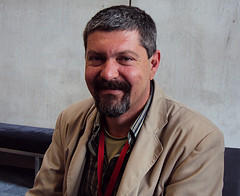User:Vtaylor/CIS2/Fall 2009/Group 3
Contents
Online Education
Online education is a powerful and convenient method of education, especially in the 21st century. Today, computers, internet, and technology are used extensively everywhere. Learning skills in technology is critical to workers in the 21st century business community. Many jobs requires computer skilled employees. Distance learning is also one of the most convenient ways for many learners and students who are unable or incapable of physically attending classes. However, there are some issues involved in distance learning, but the benefits seem to outweigh the negative effects. There are numerous benefits for students taking online courses. Overall, these skills are useful for everyone in seek of a better education and higher skills to utilize in the future.[1]
Advantages
- Distance learning is a convenient way to learn, especially for mothers with children in need of constant care. Anytime, anywhere access can be very helpful for learners with other priorities including workers whose job schedule conflicts with class hours. Other students feel that they are allowed to attend courses online when they are fully awake and focused, rather than being tired and bored in the classroom which can cause a lack of perception.
- Students can learn in the method they find best, whether they are highly visual, aural, read/write, kinesthetic, or multimodal learners.
- Online education allows for the ability to access courses 24 hours a day, 7 days a week to read, review and better understand discussions, lectures, comments, and explanations without missing a class period or being distracted in class. It also allows them to take their time to think about what they want to say, reply, or comment. Some students who are taking online courses feel much less intimidated. Anonymity gives everyone a chance to contribute and helps students express their opinion without being judged for being biased because of gender, race, or age.
- Distance learning is convenient for the physically disabled people and people with other dysfunctions.
- Students' interactions such as group discussions, chatrooms, group projects, and formal and informal conversations between students and teachers can increase bonding and camaraderie as well as the diversity of opinions and facilitate skills for team learning.
- Online education leads to enhanced contact between students and instructors. Instructors are more approachable since students can contact them openly using email, discussions and/or chatting without waiting for office hours.
- Using the internet to research information online teaches students skills in technology which are valuable in this century.
- There is less time and cost spent on traveling to campus.
- Online instructors can contribute with practical knowledge and skills from anywhere across the globe, which exposes the student to knowledge that cannot be learned in books.
- Online education increases the diversity of course material which may not be available locally, and is especially beneficial for students who live in remote rural areas that cannot support college or vocational training centers.
- Online education allows widespread access to free educational tools such as podcasts, images, graphs, diagrams, tables, games, links, discussion pages, files, software, multilingual online dictionaries, and so much more.
Disadvantages
- There is an isolation and lack of physical interaction with classmates, peers, and instructors.
- Self-motivation and discipline is required in order for the student to progress in a timely manner.
- There is a possibility of limited opportunities to use local networks, computers, high speed internet, software programs, etc.
- Lack of physical activities can cause obesity and wearing out your body through mental exertion can cause fatigue.
- There may be timezone differences, depending on the areas where students and instructors live. [2]
What is WikiEducator.org?
|
“If I give you a penny, you will be one penny richer and I’ll be one penny poorer. But if I give you an idea, you will have a new idea, but I shall still have it, too.” Albert Einstein [3] |
WikiEducator is global community project founded by Wayne Mackintosh[[1]], striving towards providing a free version of an online education curriculum and free content.
It is built for academic people, educators, and students to contribute openly by providing mass collaboration through adapting, reusing and sharing educational material to establish free and open teaching materials and online distance learning. This will benefit so many people worldwide as well as be very useful for higher education. It will also allow contributors to freely share their knowledge without speech restrictions. This project can lead to so much success and growth with advanced technology and technological skills. Technological success and education will bring about a better future for all[4].
What is OER?
OER stands for open educational resources, which are freely available for use, reuse, adaptation, and sharing[5]. OERs are perfect for online teaching, and are often used at WikiEducator. OERs solve the problem of copyright and fair use. You can find out more about OERs at the OER Foundation or in the OER Handbook.
What is "free content"?
Free content involves sharing knowledge with personal liberty which protects your work against commerical exploitation. [6]
What are Projects and Initiatives?
Each page on WikiEducator is its own project. Projects can range from small courses and content pages to large government or NPO led initiatives. Projects are often a work in progress, and it's easy to help out one that you like; it's also easy to start your own!
WikiEducator.org Projects
These are just a sampling of the projects that WikiEducator is part of. Many of these examples here are initiatives.
Teacher Collaboration
The Teacher Collaboration Portal is an initiative especially designed for teachers who want to develop content and share ideas with one another. It also acts as a starting point for teachers looking to learn how to teach online classes. The portal offers free online learning workshops with such topics as wiki usage, OERs, and integrating technology, and these workshops are still ongoing, so sign up now.
Open Schools
Open Schools is an initiative in progress that teaches educators to use wikis to bring down the cost of education in order to achieve universal access to school-level education. This initiativen also runs workshops that teach financing, budgeting and costs associated with running an open school.
English for Speakers of Other Languages
This project, ESOL, is a collaborative project aimed at develop online workshops that teach a critical skill in today's world, that of speaking English. Their next workshop is coming up in March, 2010. The workshops will teach all skill levels, all ages, and will teach grammar, spelling, vocabulary, reading and writing, and speaking and pronunciation.
Learning 4 Content
The Learning 4 Content project is designed for WikiEducator educators worldwide to train wiki skills at not cost. Learners are to donate through sharing knowledge or developing educational resources in return. [7]
How To Help
If you see a project that you like in the example list, or have thought of something that you'd like to see in the list, then feel free to help. Everything you need to know to get started helping can be found on the Help Page. This page contains tutorials, FAQs, links to forums, a list of policies on helping, and more. The first step is to register an account. Another good place to start is the page on Using WikiEducator.
For contributions and collaborations, here are the instructions for online workshop to the learning 4 content project.
Learning4Content
Final Project Area
Strategy
We made the assumption that the audience is a person new to WikiEducator and interested enough in it to click some Help/About link. Because they are already here and may be willing to help out, we show them the merits of existing projects, and immediately provide more links they can follow to help out. Many visitors will be teachers, so the first example project shown is teacher oriented.
Additional Resources
Here are some other quality pages you may be interested in:
PYTHON TUTORIALS
The Anatomy and Physiology of Animals
Quality Assurance Framework
Pilot Projects
Parenting
Open Educational Content
Teacher Mentoring
Find many more initiatives here: Initiatives
Links
http://en.wikipedia.org/wiki/Commonwealth_of_Learning Commonwealth of learning
http://www.oercommons.org/ Open Educational Resources
http://www.olcos.org/ Open eLearning Content Observatory Service
http://opened.creativecommons.org/What_is_Open_Education%3F What is Open Education
http://teachingandlearningissues.ucalgaryblogs.ca/2009/03/11/links-from-george-siemens-presentation/comment-page-1/ George Siemens presentation
http://www.worldwidelearn.com/business-course/nonprofit-fundraising-course.htm Non-profit organization
http://wikieducator.org/Learning4Content Learning4content hub
Media link
Articles
By Stephen Downes http://creativecommons.org/weblog/entry/17860 October 12th, 2009
George Siemens http://www.connectivism.ca/?p=151 Thursday, August 13th, 2009 at 7:26 pm
References
- ↑ http://www.distance-learning-college-guide.com/distance-learning-benefits.html
- ↑ http://www.onlinedegreezone.com/distance-learning-advantages-disadvantages.php
- ↑ http://www.olcos.org/cms/upload/docs/olcos_roadmap.pdf
- ↑ http://www.wikieducator.org/WikiEducator:About
- ↑ http://www.wikieducator.org/OER_Handbook/educator_version_one/Introduction/Defining_OER
- ↑ Wikieducator_tutorial/What_is_free_content
- ↑ http://wikieducator.org/Learning4Content
Peer reviews
This is a review of the Wikieducator page submitted by Group 3
overall 2 response to scenario 1 professionalism demonstrated 2 client audience needs 1 main theme 2 supporting points 2 organization 2 summary / conclusions 2 proposed strategy 1 action plan / recommendations 1 formatting 2 pictures – sources 2 writing / editing 2 collaboration / teamwork / communication 2 thoughtfulness 2 client support 2 facts / assumptions 2 references / citations 2 original work 2 use of wiki features – linking, discussion 2
This is an excellent summary of WikiEducator, however the presentation of societal issues isn't clear. The collaboration is quite effective as it flows seamlessly. I did not observe any recommendations to Wikieducator to improve their visibility to educators. I'm not sure how I would improve it except to reduce the length of the summary of what Wikieducator is and add sections which provide more information about the content of Wikieducator and links to provide examples of it's content.
Group #3 Online Education
Score: 3
- Mechanics: I didn’t find spelling errors and the citations that they used were few but well-structured.
- Organization: I think the content is logically organized, has a different organization to the previous group because this group started talking about his main topic and what were its advantages and disadvantages, then begins to explain how WikiEducator can be a useful tool in their main topic.
- Originality: The group shows some original thought and then explains the issues with other online materials.
- Requirements: I think the requirements are not complete because the problems were not discussed in great depth are just mentioned, there is little information. And the final project delivery was late.
- Content: Although the project doesn’t cover the topics in depth because it only shows the basic knowledge about the subject, I like the way all the time they are offering the opportunity for educators to start using WikiEducator immediately, they placed a link which has a login to sign up right away and it was something that the other group did not do this.
I’m going to review the group project 3 and grade it. I think I would grade it 37/52 I really like the way that the group 3 acts. It’s a good page with some important and useful information. Also they gather all this information in the group page properly. That looks a great team work and participation. The group page show that each member has provided good information and then this information is edited in a good way on the page. It contains some related pictures and also good sources. In the following there are some grading divisions and the way that I’ve graded the group project.
Overall 2 Professionalism demonstrated 2 writing / editing 1 formatting 2 client audience needs 2 main theme 2 supporting points 2 organization 2 proposed strategy 2 action plan / recommendations 2 response to scenario 2 pictures – sources 2
client support 2 collaboration / teamwork / communication 2 thoughtfulness 2 use of wiki features – linking, discussion 2 original work 2 references / citations 2 facts / assumptions 2
Suggestions:
- I think if the “what is Wikieducator.org” came at the first of the page it would be better and then the description could come later. - The sub title has a bold and big size font, they could be smaller and just the main title could be provided by this much big font size. - The edition could be better. I mean each topic which is related to its parts could be determined better. - There’s no summary determined at the end.
They really did a great job. I liked the page and the project. I think it has lots of information as well.
Group 3 : Online Education 3/5
1 Well organized
2 Vast amounts of resources and information
3 Informed the reader
I was able to go through the information. With all of my questions being answered and also answering ones that I didn’t even have but were brought up by the group sections about online education. If I wasn’t a person already enrolled in an online course I would want to get signed up for one so I could experience it for myself for the first time.
Cons:
1. Full website addresses Showing the full web addresses in the Links area threw off the vibe I had of this project being completely polished. You can create the link so it’s just a word or two ask some of the other members were able to do. It looks much more professional.
Group 3 - No formal title
Mechanics - 2 Organization - 4 Originality - 2 Requirements - 2 Content - 3 Collaboration - 4
I scored this project as above due to the APA sources not being cited properly, more than 3 spelling errors for mechanics. Organization was well done and logical, but just not perfect. It did not appear to be completely original writing, but more copy and paste from other sources. It met all the requirements of the project. The content covers the project to an adequate degree. To improve the project I would suggest elaborating on the topics that were included in the project. I would also suggest adding more actual original content to the project.



